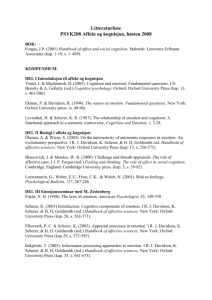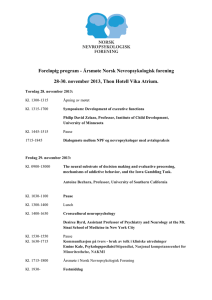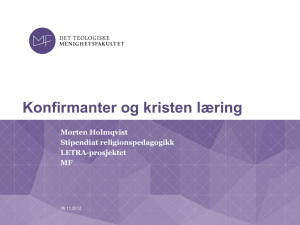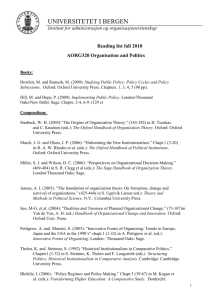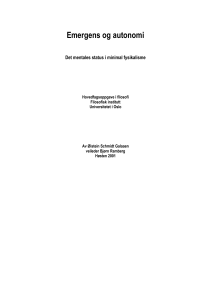Pensumoversikt: Psyk 108 Affekt og kognisjon
advertisement
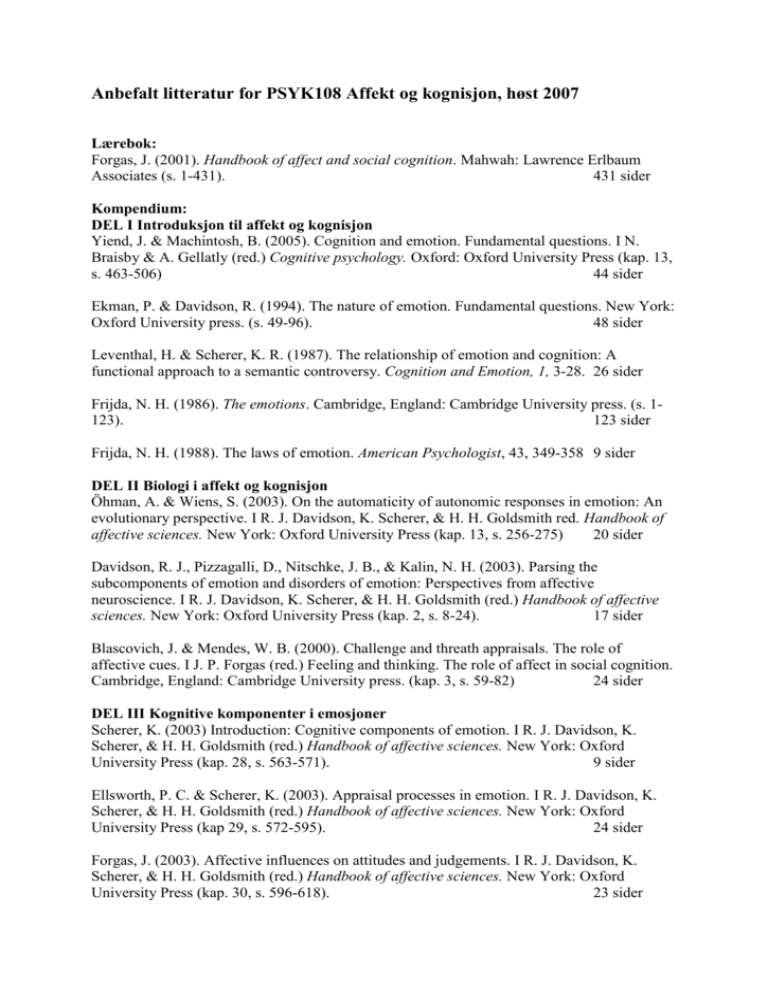
Anbefalt litteratur for PSYK108 Affekt og kognisjon, høst 2007 Lærebok: Forgas, J. (2001). Handbook of affect and social cognition. Mahwah: Lawrence Erlbaum Associates (s. 1-431). 431 sider Kompendium: DEL I Introduksjon til affekt og kognisjon Yiend, J. & Machintosh, B. (2005). Cognition and emotion. Fundamental questions. I N. Braisby & A. Gellatly (red.) Cognitive psychology. Oxford: Oxford University Press (kap. 13, s. 463-506) 44 sider Ekman, P. & Davidson, R. (1994). The nature of emotion. Fundamental questions. New York: Oxford University press. (s. 49-96). 48 sider Leventhal, H. & Scherer, K. R. (1987). The relationship of emotion and cognition: A functional approach to a semantic controversy. Cognition and Emotion, 1, 3-28. 26 sider Frijda, N. H. (1986). The emotions. Cambridge, England: Cambridge University press. (s. 1123). 123 sider Frijda, N. H. (1988). The laws of emotion. American Psychologist, 43, 349-358 9 sider DEL II Biologi i affekt og kognisjon Öhman, A. & Wiens, S. (2003). On the automaticity of autonomic responses in emotion: An evolutionary perspective. I R. J. Davidson, K. Scherer, & H. H. Goldsmith red. Handbook of affective sciences. New York: Oxford University Press (kap. 13, s. 256-275) 20 sider Davidson, R. J., Pizzagalli, D., Nitschke, J. B., & Kalin, N. H. (2003). Parsing the subcomponents of emotion and disorders of emotion: Perspectives from affective neuroscience. I R. J. Davidson, K. Scherer, & H. H. Goldsmith (red.) Handbook of affective sciences. New York: Oxford University Press (kap. 2, s. 8-24). 17 sider Blascovich, J. & Mendes, W. B. (2000). Challenge and threath appraisals. The role of affective cues. I J. P. Forgas (red.) Feeling and thinking. The role of affect in social cognition. Cambridge, England: Cambridge University press. (kap. 3, s. 59-82) 24 sider DEL III Kognitive komponenter i emosjoner Scherer, K. (2003) Introduction: Cognitive components of emotion. I R. J. Davidson, K. Scherer, & H. H. Goldsmith (red.) Handbook of affective sciences. New York: Oxford University Press (kap. 28, s. 563-571). 9 sider Ellsworth, P. C. & Scherer, K. (2003). Appraisal processes in emotion. I R. J. Davidson, K. Scherer, & H. H. Goldsmith (red.) Handbook of affective sciences. New York: Oxford University Press (kap 29, s. 572-595). 24 sider Forgas, J. (2003). Affective influences on attitudes and judgements. I R. J. Davidson, K. Scherer, & H. H. Goldsmith (red.) Handbook of affective sciences. New York: Oxford University Press (kap. 30, s. 596-618). 23 sider Loewenstein, G., & Lerner, J. S. (2003). The role of affect in decision making. I R. J. Davidson, K. Scherer, & H. H. Goldsmith (red.) Handbook of affective sciences. New York: Oxford University Press (kap. 31, s. 619-642). 24 sider Ochsner, K. N, & Schachter, D. L. (2003). Remembering emotional events: A social cognitive neuroscience approach. I R. J. Davidson, K. Scherer, & H. H. Goldsmith (red.) Handbook of affective sciences. New York: Oxford University Press (kap. 32, s. 643- 660). 18 sider Dalgleish, T. (2003). Information prosessing approaches to emotion. I R. J. Davidson, K. Scherer, & H. H. Goldsmith (red.) Handbook of affective sciences. New York: Oxford University Press (kap. 33, s. 661-673). 13 sider DEL IV Modeller om affekt og kognisjon Forgas, J. P. (1992). Affect in social judgements and decisions. A multiprocess modell. Advances in Experimental Social Psychology, 25, 227-275 49 sider Schwarz, N. (2001). Feelings as information: Implications for affective influences on information processing. I L.L. Martin & G. Clore (red.) Theories of mood and cognition: A user’s guidebook, s. 159-176. Mahwah: Lawrence Earlbaum. 18 sider Loewenstein, G., Weber, E.U., Hsee, C.K., & Welch, N. (2001). Risk as feelings. Psychological Bulletin, 127, 267-286 20 sider DEL V Teoretisk overbygning: ’Dual process theories’ Chen, S. & Chaiken S. (1999). The heuristic-systematic model in its broader context. I S. Chaiken & Y. Trope (red.) Dual process theories in social psychology. (kap. 4, s. 73-96) 24 sider Epstein, S. (1994). Integration of the cognitive and the psychodynamic unconcious. American psychologist, 49, 709-724. 16 sider Epstein, S. & Pacini, R. (1999). Some basic issues regarding dual process theories from the perspective of cognitive-experiential self theory. I S. Chaiken & Y. Trope (red.) Dual process theories in social psychology. (kap. 23, s. 462-482). 20 sider
